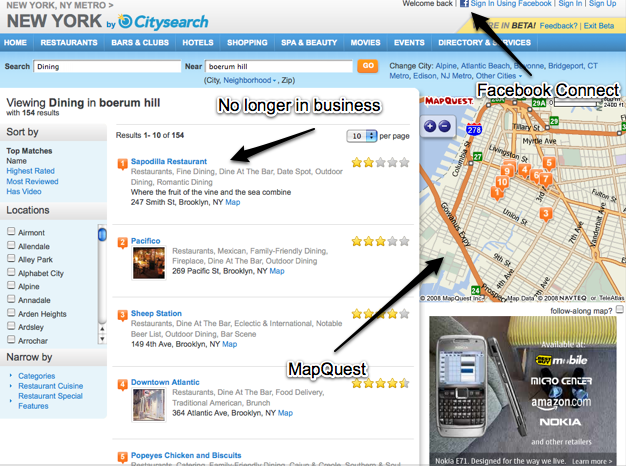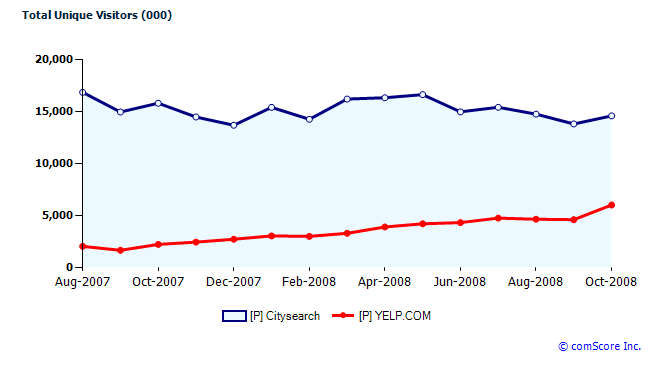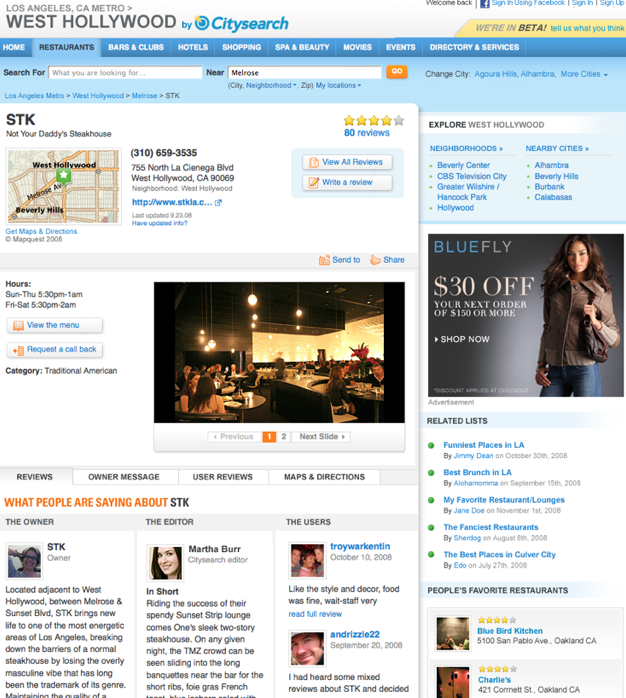
Citysearch is finally coming around to replacing its creaking site design with something a little more contemporary. Today, it is launching in a major rethink of its entire site in beta that drills deeper into neighborhoods, uses Facebook Connect as an optional identity system, and lets users vote reviews up and down. The beta will quickly become the default Citysearch experience. During a demo at IAC headquarters yesterday, Citysearch CEO Jay Herratti told me:
We’ve been working on it for 10 months and built everything from ground up. In Q1 we will be turning off every system that operates Citysearch today, and running everything in the new environment.
Citysearch’s engineers stripped out the decade-old proprietary code that runs Citysearch and replaced it with open-source code. By replacing what’s under the hood, they were freed up to make some major improvements that are immediately apparent. The main changes are:
1. Hyper-local content. Citysearch is currently organized by city, so no matter what neighborhood you are looking at you get the same city guide. With the beta, Citysearch has mapped each city by neighborhood and placed each restaurant, bar, hotel, theater, or other local business in a specific neighborhood. So now when you are looking for things to do in a given neighborhood, Citysearch can dynamically create a neighborhood guide complete with restaurants, shops, and other businesses. With this one change, Citysearch is going from 140 cities to 75,000 neighborhoods by the end of the year.
2. Hyper-social content (Facebook Connect). This is one of the biggest changes. Citysearch has only 4 million registered users, but it will now adopt Facebook Connect as an optional identity system. That means anytime someone wants to submit a review or rating who isn’t already a registered Citysearch user will be able to simply type in their Facebook username and password. Any review or rating can then appear on your in Facebook feed, just like with the old Beacon program, except with Facebook Connect it’s all opt-in. (Citysearch was an original Beacon partner, but it shut that down long ago). “Friends love to talk to other friends about local businesses,” notes Herratti.
Even better, anytime you see reviews for a particular restaurant or business,reviews from your Facebook friends will show up first. We were wondering when Facebook Connect partners would start announcing their implementations.
3. Rebalancing the power between reviewers, merchants, and editors. Instead of highlighting Citysearch’s editorial voice, the design has been tweaked so that underneath each entry thereare now three columns representing the voice of the business owner, the Citysearch editor, and the user reviewers. Citysearch reviews have become so crucial for many restaurants and bars that they’ve also become suspect in that many businesses try to game the system. Herrati says:
We are looking to restore the balance of content in the local space. By that I mean we feel UGC has been so powerful in this arena, but it also comes with a bag of issues.
So not only do business owners now have their own more prominent column to promote their business, but the reviews are now voted up or down so that the community can self-moderate the most obviously abusive comments.
4. A better mobile experience Finally, since everything has been remapped by neighborhood, Citysearch is well positioned for mobile apps. But Citysearch is also working hard to optimize the experience for mobile browsers. It is using the geo-location API in Google Gears to surface nearby results for anyone using a phone running Windows Mobile 5 or higher. For everyone else, it remembers the last destination you specified by typing into your phone. t is also working on specific apps for phones with GPS chips. An iPhone app will come later this quarter, and Android and Blackberry apps are also in the works.
Overall, Citysearch is taking some big steps in the right direction. Facebook Connect is going to be huge for the site. With the turn of a switch, it now has social features it would have been nearly impossible to build on its own. Who wantsto become someone else’s friend on Citysearch? But if you can find your existing friends there, that is one more reason to use it.
In practice, it still has a ways to go in terms of bringing up the best results at the neighborhood level. At least that was the case for my neighborhood in Brooklyn. The top result for dining brought up a restaurant that went out of business a long time ago. Too bad you can’t vote search results up and down.

In terms of Citysearch’s business, though, the hyperlocal results will really help with its local search business. The one part of the new Cityseearch that is not open-source is Citysearch Pay, its pay-for-performance ad engine that turns up sponsored results on a neighborhood-by-neighborhood level. In teh future, it will introduce “event variable price per lead.” Basically, that means businesses will be able to bid on how much they are willing to pay for different types of leads. Viewing a geo-proximate ad on a mobile phone could be one type of lead, texting an address to a friend could be another, as could playing a video profile of a business or making a reservation.
And these types of ads would not be limited to its own site. Citysearch also operates an ad network for partner sites looking to bring more local content. Herrati explains:
Between a quarter and at third of revenues comes from the ad network. If you look at impressions and uniques, it crushes our network.
The ad network’s reach crushes it by ten to one. According to comScore, Citysearch brought in 14.6 million unique visitors in the U.S in October, compared to 143 million uniques across its ad network. (Yelp, by the way, did 6 million uniques). By doing abetter job mapping all of its data on local businesses, Citysearch should be able to boost the relevance of its search results and therefore how much it gets paid for them. Maybe Barry Diller should start breaking out results for Citysearch now that IAC is a smaller entity.

